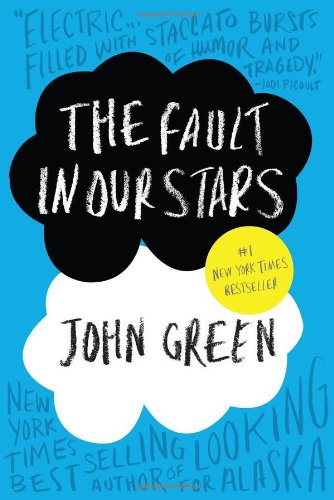All Nonfiction
- Bullying
- Books
- Academic
- Author Interviews
- Celebrity interviews
- College Articles
- College Essays
- Educator of the Year
- Heroes
- Interviews
- Memoir
- Personal Experience
- Sports
- Travel & Culture
All Opinions
- Bullying
- Current Events / Politics
- Discrimination
- Drugs / Alcohol / Smoking
- Entertainment / Celebrities
- Environment
- Love / Relationships
- Movies / Music / TV
- Pop Culture / Trends
- School / College
- Social Issues / Civics
- Spirituality / Religion
- Sports / Hobbies
All Hot Topics
- Bullying
- Community Service
- Environment
- Health
- Letters to the Editor
- Pride & Prejudice
- What Matters
- Back
Summer Guide
- Program Links
- Program Reviews
- Back
College Guide
- College Links
- College Reviews
- College Essays
- College Articles
- Back
The Fault In Our Stars by John Green
If you are a lover of reality and tragedies, you are, perhaps, at the right place. 'The fault in our stars', as the blue cover page with drawing of clouds- which although sometimes look a bit childish or just another one of the chic flic romance novels- says, is a journey of love, romance, struggle and hope. A small thin book with less than 100 pages perfectly covers a lot more than what a 500 page bestseller cannot. Suffice to say, the writer, John Green, managed to articulately compact an ocean of emotions into a river. As you go through the book, you'll notice how impossible it becomes to divert your attention to other things, as this page turner would tightly grip you in its story, leaving an impact long after you've turned to the last page. The story starts with an epigraph, a 4-liner which talks about time and tide, which is really difficult to understand before reading the whole novel. So I suggest, read it by the end of the novel as well. So, right at the starting of the first chapter, you are introduced to a cancer victim, an introvert, who hates socializing and spends most of her time in bed, 'thinking about death' as it says. As you read along you'll notice how the writing style is very frank and she expresses whatever first comes into her mind- one of the reasons the book was a hit- so it always feels like she is directly talking to the reader. The cancer fighter attends a Support group every week where she meets other people with the same disease and they discuss and try to cheer each other up and spread rays of hope from the 'literal heat of Jesus' as it says. Although, the Protagonist, Hazel Grace, is never really fond of this meeting and merely attends it to please her parents; 'I went to Support Group for the same reason that i'd once allowed nurses with mere 18 months of graduate education to poison me with exotically named chemicals: I wanted to make my parents happy.' In that Support Group meeting, she cuts a glance at a hot, good-looking guy, Augustus Waters, obssessed with making his life and death remembered, who's in remission and has suffered from bone cancer which led to his leg getting amputated. Hazel Grace gets into a short debate with him and afterwards meets him outside in the Parking lot where he invites her for a movie at his home; an invitation reluctantly accepted later on. The story takes twists and turns as we meet Augustus' friend Isaac who has tumour spread to his eyes and how he manages through. Also, the way Hazel Grace never gives up on anything and continues fighting- she was known as the 'survivor'- is quite remarkable. In the turn of events, Augustus and Hazel fall in love with each other, a teenage love with all its charms and compassion, and Hazel gives up on her idea of staying away from Augustus just so they both don't get hurt in the end. The star-crossed lovers spend a great deal of the remaining times of their life together, understanding their strengths and weaknesses and supporting each other. It later shows how Augustus, obsessed with bequeathing a legacy, makes his friend to write his eulogy and make corrections to it. 'He started to cry. He pressed his forehead against the podium and I saw his shoulders shaking and then he finally said, ''Goddamnit, Augustus, editing your own eulogy." ' Augustus and Hazel will stay with you long after you've read the book, crying through it. (this is not an over statement) This is not a story of two hopeless romantics, but the one which tells us how in reality, there's not always a 'happily ever after' and how sometimes it's not our fault that life is not a Genie Foundation where all our wishes are granted, but sometimes it's, actually, the fault in our stars...
Similar Articles
JOIN THE DISCUSSION
This article has 0 comments.

